Picador USA
Our Migrant Souls: A Meditation on Race and the Meanings and Myths of "Latino"
Couldn't load pickup availability
WINNER OF THE KIRKUS PRIZE FOR NONFICTION
NAMED ONE OF THE NEW YORK TIMES' 100 NOTABLE BOOKS OF 2023
ONE OF TIME'S 100 MUST-READ BOOKS OF 2023 A TOP TEN BOOK OF 2023 AT CHICAGO PUBLIC LIBRARY
A new book by the Pulitzer Prize-winning writer about the twenty-first-century Latino experience and identity.
In Our Migrant Souls, the Pulitzer Prize-winning writer Héctor Tobar delivers a definitive and personal exploration of what it means to be Latino in the United States right now.
"Latino" is the most open-ended and loosely defined of the major race categories in the United States, and also one of the most rapidly growing. Composed as a direct address to the young people who identify or have been classified as "Latino," Our Migrant Souls is the first account of the historical and social forces that define Latino identity.
Taking on the impacts of colonialism, public policy, immigration, media, and pop culture, Our Migrant Souls decodes the meaning of "Latino" as a racial and ethnic identity in the modern United States, and gives voice to the anger and the hopes of young Latino people who have seen Latinidad transformed into hateful tropes and who have faced insult and division--a story as old as this country itself.
Tobar translates his experience as not only a journalist and novelist but also a mentor, a leader, and an educator. He interweaves his own story, and that of his parents' migration to the United States from Guatemala, into his account of his journey across the country to uncover something expansive, inspiring, true, and alive about the meaning of "Latino" in the twenty-first century.
Share
Book Details
ISBN:
9781250335814
EAN:
9781250335814
Binding:
Paperback
Pages:
256
Authors:
Héctor Tobar
Publisher:
Picador USA
Published Date: 2024-24-09
View full details
I really wanted to like this book, but couldn't. The author is so full of himself, and the writing is all over the place. There is no point, no direction, no sense in reading it. Le pone mucha crema a sus tacos y al final no dice nada.
Interesting read. Although, my Dad who I gifted it to has started reading it.
Excelente livro onde o autor aborda nos capítulos aspectos sobre o povo latino e sua grande contribuição na formação dos EUA.
I bought this book for my partner who is Guatemalan-American, like the author. We both ended up reading it over the course of two weeks (it's large font and easy to read). It put words to feelings and thoughts that are often hard to describe. Highly recommend.
Héctor Tobar is a professor of Chicano/Latino Studies and English at UC Irvine. Born in LA to Guatemalan parents, Dr. Tobar has spent a large part of his life documenting, both as a journalist and as a novelist, political struggles in Mexico City, Guatemala City, Buenos Aires, and elsewhere. In Our Migrant Souls, Dr. Tobar aims his nuanced and critical eye at what it means to be Latinx in the 21st Century in America. His book is dedicated to the countless Latinx students he’s worked with, writing, “’Ethnicity’ and ‘race’ are sold to us as boxes containing our skin tones and our surnames, but the truth about you, about us, will not fit in any box.” He untangles the historical and social forces that have created the current narratives that are told of a people, interweaving his own family story with roots in Guatemala with the stories of several others whose disparate experiences comprise the spectrum of Latinidad. His book paints a very personal portrait of the effects colonialism and public policy have had on a group often ignored, marginalized, or maligned.


